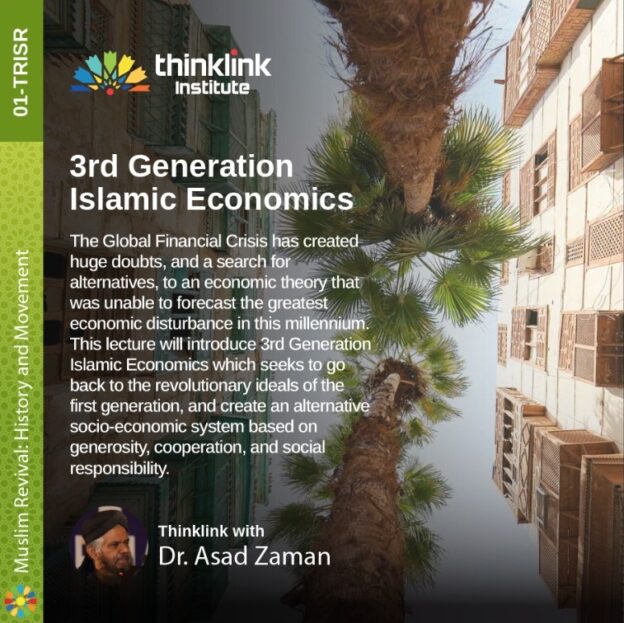Welcome to the 3rd Generation Islamic Economics Workshop Course with Dr. Asad Zaman.
Course Details:
There will be 8 live Class Workshops; these are marked as W1, W2, W3, W4, W5, and W6. In addition there are supplementary lectures, marked as S1, S2, …. The workshop materials are compulsory while the supplements provide additional information. There will also be quizzes marked as Q1 Q2 etc.
Presenter: Dr. Asad Zaman
Topic: Exploring 3rd Generation Islamic Economics
Timing for the Sunday Lectures will be
- 6 AM New York
- 1 PM London
- 2 PM Turkey
- 4 PM Pakistan
- 6 PM Jakarta, Indonesia
For a long time, I have been working on developing a new approach to Islamic Economics. Currently, around the globe, IE is being taught on the Islamization of Knowledge paradigm. This means that we take an existing body of knowledge (modern Economics) and Islamize it by eliminating those things which are contrary to Islam, and adding those things which are prescribed by Islam. In a short formula: IE = Capitalist Economics + Zakat - Interest. The reality is that the discipline of Economics emerged in Europe as an attempt to understand the mechanics of secular modern European societies, and continues to be a theory of capitalist economics. Foundations of capitalism are accumulation of wealth, competition, individualism, and hedonism. These contrast with fundamental principles of charity and generosity, cooperation, social responsibility, and striving for success on the day of Judgement (instead of maximizing pleasure in this world). So, it is impossible to Islamize modern Economics. We need to reject it and rebuild the entire discipline on Islamic Foundations. This workshop will explain how we can teach 3rd generation Islamic Economics to our students, based on rejecting modern economics and replacing it with a discipline built on the moral foundations of Islam. My book entitled "Islamic Economics: The Polar Opposite of Capitalist Economics" provides a deep and thorough discussion of the contrasts between Capitalism and an Islamic Economic system. Registrants for this workshop can read and download the book from here: https://anyflip.com/wgogb/snfa/ This workshop is being offered primarily to teachers of Islamic Economics, but anyone who is interested may participate. It will consist of a set of 6 lectures listed below.
All lectures will be on Sundays via ZOOM link: PRELIMINARY MATERIAL
- S1: Crisis in Islamic Economics. This provides a historical introduction to how Islamic Economics emerged in the 20th Century, and also the differences between first, second, and third generations of Islamic Economics.
FIRST THREE LECTURES of the Workshop on Teaching of 3rd Generation Islamic Economics
- W1: (9/17) What is Knowledge? The Central Battle: Ontology and Epistemology refer to what exists, and how we can know about it. The European intellectual tradition rejected God, and limited ontology to what can be observed. The Quran begins by stating that it contains guidance for those who believe in the unseen. These conflicting ontological assumptions impact on the entire structure of knowledge, including economics.
- W2: (9/24) Historical Origins of Capitalism: Modern Western Social Sciences emerged as an effort to create a society without God. This venture has led to crises on political, economic, social, and environmental fronts. Understanding the historical which led to the creation of modern social science gives us deep insights into the nature of this “knowledge”, and also why it is in dramatic conflict with Islamic views on how to build a good society.
- W3: (10/1) Uloom-ul-Umran: Developing our own social science, based on the Islamic intellectual heritage, and Islamic concepts of an ideal society. This includes politics, economics, society, and environment, which must be treated as an integrate whole. In particular, economics cannot be studied in isolation.
There will be a gap of three weeks in the live lectures. Supplementary materials - readings and videos - will be provided for each of these weeks on this website. These are listed here:
- S2: International Financial Architecture. Two lectures discuss the rise and fall of the Gold Standard, and are essential background for understanding the modern international financial system. Morrison's book on England's Cross of Gold is also provided - this is a deep and thorough study of the gold standard, and recommended for ambitious readers, but optional for others.
- S3: Core Macroeconomic Concepts: Keynesian & Chicago-School Economics. This section discussed the major controversies in Macroeconomics over the 20th Century in their historical context.
- S4: The Ghazali Project for Islamic Revival: This explains the reason for the current depressed conditions of the Islamic Civilization, and proposes a solution.
Live lectures will resume on Sunday 29th October. The Final Three Live Workshop Lectures are listed below
- W4: (10/29) Theoretical Foundations for Islamic Economics: How we can build an Islamic society based on generosity, cooperation, social responsibility, and striving for success in the Akhira. These values are directly opposed to capitalist values of greed, competition, individualism, and hedonism.
- W5: (11/5) Institutional Structures of an Islamic Society: This lecture will discuss the institutional structures of an Islamic society, which are radically different from those of capitalist societies. We will also discuss how we can go about creating Islamic society in the modern world.
- W6: (11/12) How to teach 3rd Generation Islamic Economics? Teachers who wish to adopt the substance and methodology for this new approach to Islamic Economics will face many different challenges. In this lecture, we will discuss resources available currently, and different methods for meeting these challenges.

